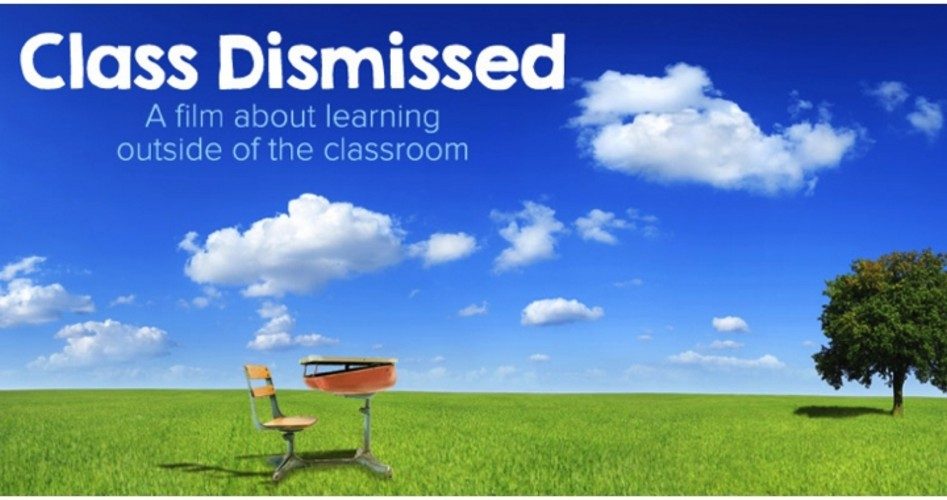
Class Dismissed, a new full-length documentary film about homeschooling, was screened in the Boston area on December 1, having already been seen by sold out audiences in November on the West Coast (Los Angeles, San Francisco, Seattle, and Portland). It explores the rapidly growing homeschool movement — its challenges and great successes. I was informed about it by my old friend and “unschooling” pioneer Pat Farenga, who appears briefly in the film. He described it in an e-mail:
Class Dismissed follows one family’s quest to better their children’s lives by pulling them out of one of the highest-rated schools in L.A. Parents Rachel and Todd are frustrated by the rigid state-imposed standards of the modern educational system and hope 21st century technology and new research will provide a means for their two daughters to earn a quality education outside the modern school system. They quickly discover that they must overcome long-standing assumptions about education and face the social ramifications of their bold experiment.
How does one go about making a film of this type without the backing of a couple of millionaires? According to Jeremy Stuart, director of the project, the film was conceived as a community effort and financed by the donations of several hundred people. Stuart writes:
Our funding strategy involve[d] targeting film institutions and organizations who support projects similar to ours. These funders are much more inclined to support a project if seed funding and audience research are in place. Therefore we are also using crowdfunding to create an economical base for our work. Crowdfunding describes the collective cooperation, attention and trust by people who network and pool their money together, usually online, in order to support efforts initiated by other people or organizations.
In other words, a talented filmmaker can find ingenious ways of raising the funds needed to create a full-length movie on education that can change the minds of millions of parents disgusted with dysfunctional public schools but ignorant of the benefits of homeschooling.
Just put in “Class Dismissed movie” to see excerpts on YouTube. It is directed toward that large population of secular parents disillusioned with the rigid, prison-like machine called public education. Unlike the early homeschool pioneers, who were more concerned with freedom of religion and escaping government control than with a structured curriculum, these new homeschoolers tend to follow the “unschooling” movement inspired by the late John Holt and John Taylor Gatto.
The public schools see children as academically lazy pupils who have to be forced to learn. Unschoolers see children as natural learners whose innate talents are suppressed by the very structure of the public school schedule and its unnatural, illogical demands. Unschoolers believe that children left to their own devices and with access to the Internet will teach themselves what they have to learn.
Christian homeschoolers tend to prefer a ready-made curriculum based on traditional teaching methods, such as those offered by Pensacola Christian University’s Abeka programs, Bob Jones University’s home education curriculum, and others, with overt religious content. However, as a large number of blogs attest, Christian homeschoolers vary in their approaches to teaching.
Unschoolers believe that classrooms deaden learning and that nothing in public education is natural. They say public schools trains kids to become cogs in the wheels of the economy, instead of makers of a new economy. Indeed, many public school graduates can barely read or write a coherent report for their future employers. In other words, 12 years of regimented schooling conducted by government doesn’t turn out educated, competent adults, but rather, college freshmen who have to be taught the basic academic skills that K-12 didn’t bother to teach them. Indeed, according to a story in yesterday’s New York Times, at most public universities only 19 percent of full-time students earn a bachelor’s degree in four years. At community colleges only five percent earned an associate degree within two years.
In other words many students have difficulty overcoming the damage done to them in K-12.
Could unschooling possibly do worse? Au contraire! Kids in this program fare far better, and are also happier. One 16-year-old homeschooler has created a 30-minute YouTube blog in which she tells her fellow teenagers what a great time she’s having in control of her own education. She can even do her work in her pajamas. She says, “Why wait until you graduate from public school, go to college and get married to be happy? You can be happy every day right now as a homeschooler.”
Words of wisdom from a teenager willing to take control of her own life and future. She will never become a cog in someone else’s wheel. She will create her own wheel. Here are two responses she’s received from other teenagers in their own words:
Hey this video is awesome but can you give me any tips on how to convince my parents to homeschool me? My dad does work but my mom hasn’t worked since she got me (I’m adopted btw) so she is the only one who could probably do it. but both her and my father aren’t really interested in homeschooling. the reason I ask is because I haven’t been enjoying my high school I get as and bs but I cant deal with the drama my current school has. like fights, drugs and kids who don’t care. so I hope you have tips and helping me convince them.
And,
Sweety, let me tell you something…. You are FAR more balanced and intelligent than 95% of kids that go to prison on a daily basis. Whoops! I meant to write SCHOOL, not prison…. Let’s examine the efficiency. To go to P School, you wake up at 6, get ready, ride a bus and take 3 serious classes per day for a total of 2 hours learning time. You get back home by 5. So, 11 hours for 2 hours of learning…. In my book, that’s an F-
Many public schoolers are learning about homeschooling from “unschooling” teens on the net. Unfortunately, many of their parents are indifferent to what goes on in their schools. But if they see Class Dismissed, they may have an epiphany that convinces them to let their children be themselves via home education.



